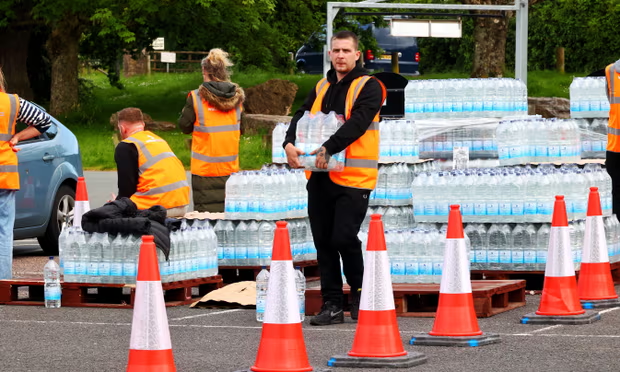The owner of South West Water has reportedly warned that global heating will increase the risk of outbreaks of the parasite that caused diarrhoea and vomiting in south Devon.
Pennon Group said that “gradual and significant increasing average and high temperatures” could pose “risks to water quality and water treatment” – including the cryptosporidium parasite – in its annual report, published this week.
The parasite, which spreads from faeces, causes cryptosporidiosis, a disease that often entails fever, vomiting and diarrhoea. The Devon outbreak has put the spotlight on the UK’s water quality, after years of scrutiny of the amount of sewage being dumped in British rivers and seas. It has also become an election issue, and the Conservative party manifesto on Tuesday promised to ban executive bonuses if a water company “has committed a serious criminal breach” and to invest in river restoration.
According to reports, about 17,000 household customers of South West Water near the seaside town of Brixham in south Devon were last month advised to boil their tap water before drinking it, after more than 100 people reported symptoms.
Read also: USAID, OCP partner to Revolutionize Agriculture
Pennon’s report said that global heating would increase the likelihood of floods from rain and rising sea levels and lead to more heatwaves and storms, all bringing higher costs.
A series of risks to water quality were also listed, including “odour, discolouration, dissolved organics, cryptosporidium”, plus “increased microbe propagation and survivability” and increased invasive species. Each of those problems would require costly maintenance or treatment to rectify.
Paul Johnston, of Greenpeace Research Laboratories, said water companies should redirect money away from shareholder dividends and executive bonuses towards increased resilience.
“Extreme temperatures will provide greater opportunities for toxic algae and pathogenic and parasitic organisms to appear in water sources and find their way into our water supply,” he said. “This is a significant risk, but blaming this all on climate change is disingenuous. The risk stems largely from our shoddy water supply and distribution system that has suffered from many years of underinvestment by water companies.”
In the latest cryptosporidium outbreak, South West Water said that it had started treatment of a tank at the hamlet of Boohay with ultraviolet light, which kills the microbes. It had previously treated a tank at nearby Hillhead. The company has also flushed the pipes and cleaned them using “ice pigging”, which uses a slurry of ice and water to push out any dirt.
Story was adapted from the Guardian.
